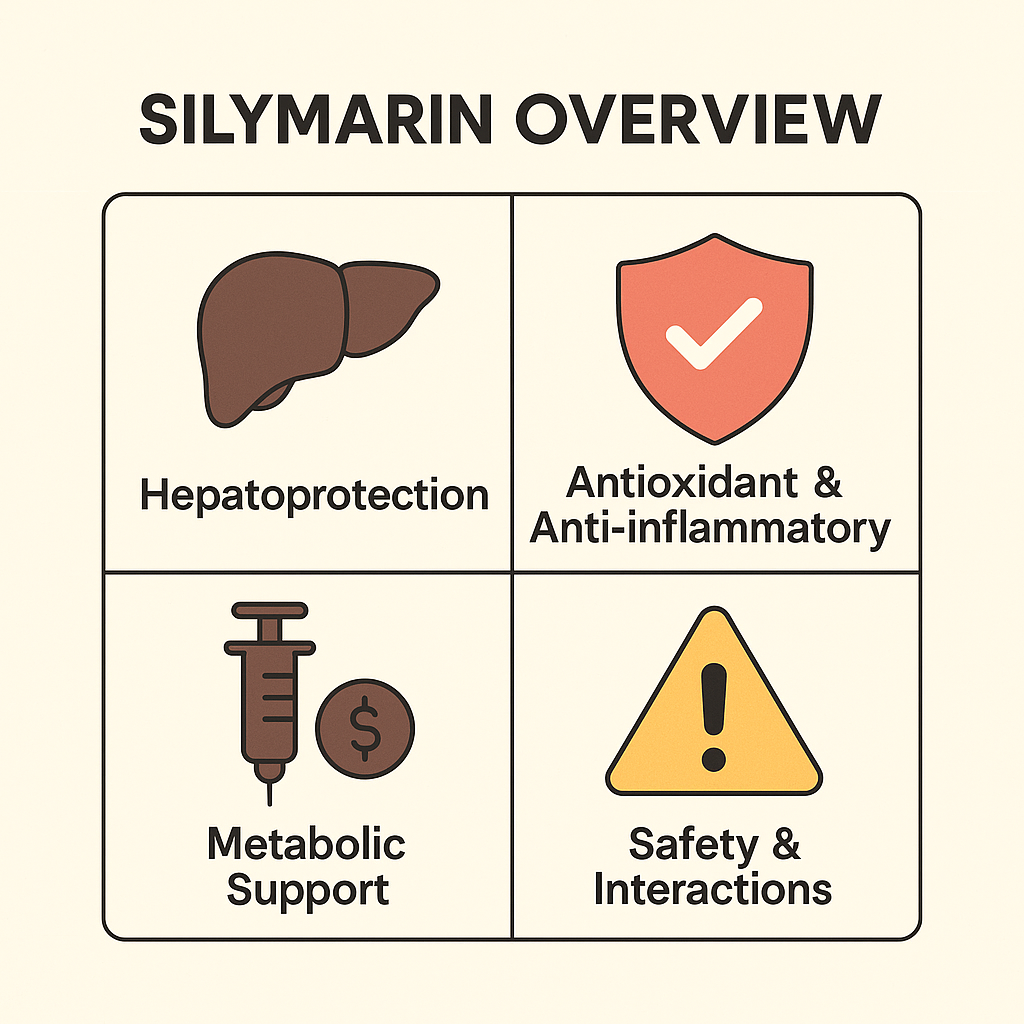
Hepatoprotection & Liver Enzyme Reduction
Share
Clinical trials and meta-analyses highlight silymarin’s ability to improve liver markers in chronic liver diseases:
-
A systematic review and meta-analysis of eight randomized trials (in NAFLD/NASH patients) showed significant reductions in alanine aminotransferase (ALT) and aspartate aminotransferase (AST) after 210 mg/day for eight weeks trialsjournal.biomedcentral.com+15journals.lww.com+15pmc.ncbi.nlm.nih.gov+15en.wikipedia.org+2pmc.ncbi.nlm.nih.gov+2trialsjournal.biomedcentral.com+2.
-
A double‑blind study found that long-term (48‑week) high‑dose (700 mg/day) supplementation lowered fibrosis scores—crucial in preventing NAFLD progression .
-
Another meta‑analysis reported 65.5 % of reviewed studies noted reductions in liver enzymes, with only 13.8 % showing increases pmc.ncbi.nlm.nih.gov.
Mechanism: Silymarin acts as a potent antioxidant, reducing oxidative stress in hepatocytes, stabilizing membranes, and aiding in liver cell repair .
🧪 Anti‑Inflammatory & Antioxidant Effects
Inflammation and oxidative stress underlie many chronic diseases.
-
Clinical studies show silymarin significantly decreases inflammatory markers such as C‑reactive protein (CRP) and interleukin‑6 (IL‑6), while increasing anti‑inflammatory IL‑10, superoxide dismutase (SOD), and glutathione peroxidase (GPx) trialsjournal.biomedcentral.com+5onlinelibrary.wiley.com+5tandfonline.com+5hartleychiropracticsaintaugustine.com+14sciencedirect.com+14onlinelibrary.wiley.com+14.
-
It also modulates NF‑κB signaling and reduces pro‑inflammatory gene expression (e.g. TNF‑α, COX‑2), thus controlling inflammatory responses .
💉 Metabolic & Cardiometabolic Support
Beyond liver protection, silymarin shows promise in managing metabolic disorders:
-
Reviews show it enhances insulin sensitivity, lowers fasting glucose, and improves lipid metabolism in conditions like type 2 diabetes and NAFLD pmc.ncbi.nlm.nih.govelsevier.es.
-
A meta‑analysis (33 trials, ~1,943 participants) suggests silymarin may aid cardiovascular health and reduce elements of metabolic syndrome mdpi.com.
🧬 Antifibrotic & Anticancer Potential
Experimental and preliminary clinical data indicate additional benefits:
-
Silymarin’s antifibrotic action in liver disease is supported by preclinical studies and consensus reports mdpi.com+15sciencedirect.com+15hartleychiropracticsaintaugustine.com+15.
-
Early clinical trials hint at anti‑cancer effects—potentially through cell cycle regulation and apoptosis induction—in cancers like prostate, breast, and ovarian .
-
Silibinin, a key component, is used intravenously in Europe to treat Amanita mushroom poisoning and mitigate acute liver toxicity en.wikipedia.org.
⚠️ Safety & Drug Interactions
Silymarin is generally well tolerated, with mild side effects like gastrointestinal discomfort or headache. Allergic reactions are rare. However:
-
Some components (e.g. silychristin) can inhibit thyroid hormone transporters (MCT8), potentially disrupting thyroid function—especially concerning in pregnancy en.wikipedia.org+1en.wikipedia.org+1.
-
It may interact with drug‑metabolizing enzymes (e.g. CYP450s, P‑glycoprotein), affecting the pharmacokinetics of concurrent medications .
-
Contaminant risk: Some supplements have been found to contain high levels of mycotoxins—up to 37 mg/kg—highlighting the need for third‑party testing en.wikipedia.org.
📝 Practical Recommendations
| Factor | Recommendations |
|---|---|
| Formulation | Look for standardized extracts (Eurosil 85®, siliphos/phosphatidylcholine complexes) for improved absorption en.wikipedia.org+2pmc.ncbi.nlm.nih.gov+2en.wikipedia.org+2. |
| Dosage | Clinical trials range 210–700 mg/day for 2–12 months. Long‑term use (>12 months) studied in fibrotic liver patients . |
| Monitoring | Regularly assess liver enzymes and check for drug interactions. Consider thyroid function testing if used long term. |
🌿 Summary
Silymarin is a well-researched herbal supplement with strong hepatoprotective, antioxidant, anti-inflammatory, metabolic, and potential anticancer effects. Backed by clinical trials and systematic reviews, it offers promising support for liver health and metabolic regulation.
Yet, evidence quality varies, with many studies limited by small sample sizes or short durations. Safety considerations—particularly regarding interactions, thyroid effects, and supplement quality—underscore why consulting a healthcare professional is essential before use.
